Intake Manifold Replacement Upper
Removal Procedure
Tools Required
J 28467-360 Engine
Support Fixture
Caution: Unless directed otherwise, the ignition and start switch must be in the OFF or LOCK position, and all electrical loads must be OFF before servicing
any electrical component. Disconnect the negative battery cable to prevent an electrical spark should a tool or equipment come in contact with an exposed electrical terminal. Failure to follow these precautions may result in personal injury and/or damage to
the vehicle or its components.
- Disconnect
the negative battery cable.
- Depressurize the fuel system. Refer to Fuel Pressure Relief Procedure
in Engine Controls - 3.1L.
- Remove the top half of the air cleaner assembly.
- Drain and recover the cooling system. Refer to
Cooling System Draining and Filling
and
Flushing
in Engine Cooling.
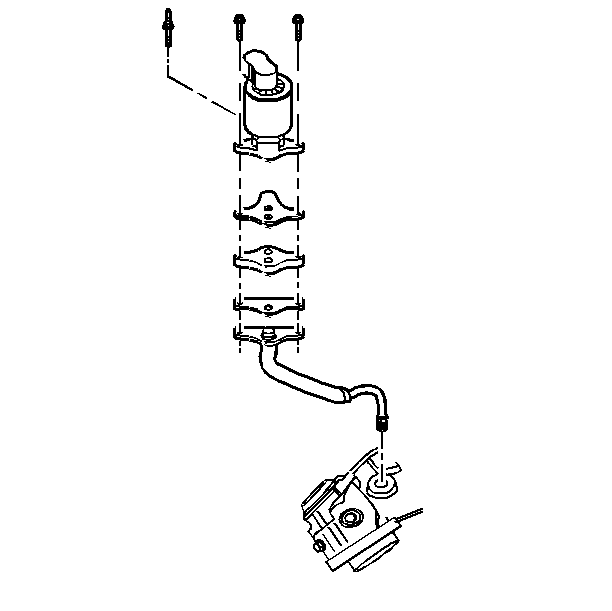
- Remove the EGR pipe from
the exhaust manifold.
- Remove the drive belt. Refer to
Drive Belt Replacement
.
- Remove the brake vacuum pipe at the plenum.
- Remove the power steering lines at the generator bracket.
- Remove the generator. Refer to
Generator Replacement
in Engine Electrical.
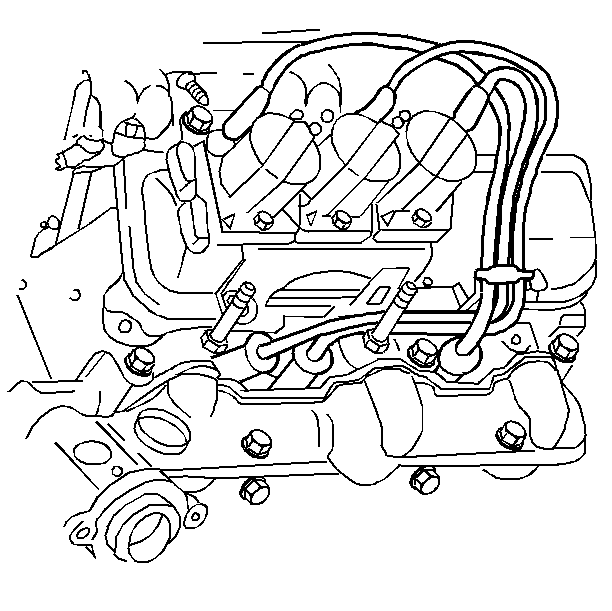
- Remove the secondary ignition
wires from the spark plugs.
- Remove the secondary ignition wires from the harness at the plenum.
- Remove the following components at the same time:
| • | Electronic ignition coil and module assembly |
| • | EVAP canister purge solenoid |
- Remove the following upper engine wiring connectors:
| • | Throttle Position (TP) sensor |
| • | Engine Coolant Temperature (ECT) sensor |
| • | Camshaft Position (CMP) sensor |
- Remove the following vacuum lines:
| • | Fuel Pressure Regulator |
- Remove the MAP sensor from the upper intake manifold.
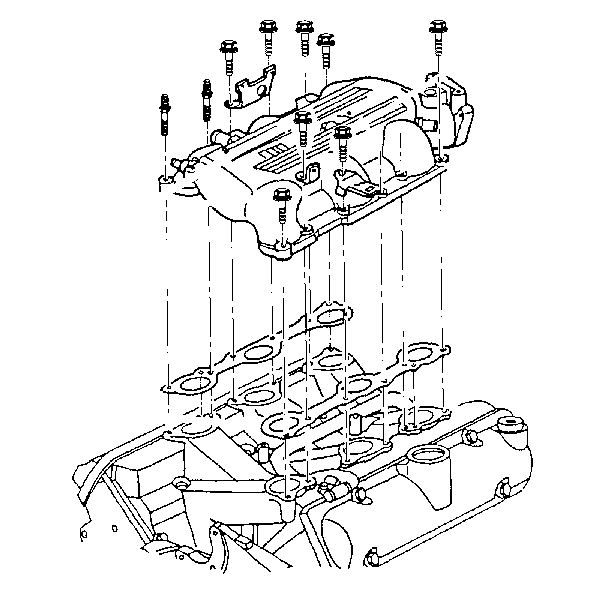
- Remove the upper intake
manifold bolts.
- Remove the upper intake manifold.
Installation Procedure

- Install the upper intake
manifold.
Notice: Use the correct fastener in the correct location. Replacement fasteners
must be the correct part number for that application. Fasteners requiring
replacement or fasteners requiring the use of thread locking compound or sealant
are identified in the service procedure. Do not use paints, lubricants, or
corrosion inhibitors on fasteners or fastener joint surfaces unless specified.
These coatings affect fastener torque and joint clamping force and may damage
the fastener. Use the correct tightening sequence and specifications when
installing fasteners in order to avoid damage to parts and systems.
- Install the upper intake manifold bolts.
Tighten
Tighten the bolts to 25 N·m (18 lb ft).
- Install the MAP sensor.
- Connect the following vacuum lines:
| • | Fuel Pressure Regulator |
- Install the following upper engine wiring connectors:
| • | Throttle Position (TP) sensor |
| • | Engine Coolant Temperature (ECT) sensor |
| • | Camshaft Position (CMP) sensor |
- Install the following components:
| • | EVAP canister purge solenoid |
| • | Electronic ignition coil and module assembly |
- Install the generator. Refer to
Generator Replacement
in Engine Electrical.
- Install the power steering line at the generator bracket.
- Install the drive belt. Refer to
Drive Belt Replacement
.

- Install the secondary
ignition wires to the spark plugs.
- Install the secondary ignition wires to the harness at the plenum.

- Install the EGR pipe to
the exhaust manifold.
- Install the following items to the throttle body:
- Install the top half of the air cleaner assembly.
- Install the brake vacuum pipe.
- Install the cables to the throttle body.
- Fill the cooling system. Refer to
Cooling System Draining and Filling
and
Flushing
in Engine Cooling.
- Connect the negative battery cable.
- Inspect for proper fluid levels.
- Check for leaks.
Intake Manifold Replacement Lower
Removal Procedure
Important: This engine uses a sequential multiport fuel injection system. Injector
wiring harness connectors must be connected to their appropriate fuel injector
or exhaust emissions and engine performance may be seriously affected.
Caution: Unless directed otherwise, the ignition and start switch must be in the OFF or LOCK position, and all electrical loads must be OFF before servicing
any electrical component. Disconnect the negative battery cable to prevent an electrical spark should a tool or equipment come in contact with an exposed electrical terminal. Failure to follow these precautions may result in personal injury and/or damage to
the vehicle or its components.
- Disconnect the battery ground (negative)
cable.
- Remove the upper intake manifold. Refer to
Intake Manifold Replacement
.
- Remove the left (front) valve rocker arm cover. Refer to
Valve Rocker Arm Cover Replacement
.
- Remove the right (rear) valve rocker arm cover. Refer to
Valve Rocker Arm Cover Replacement
.
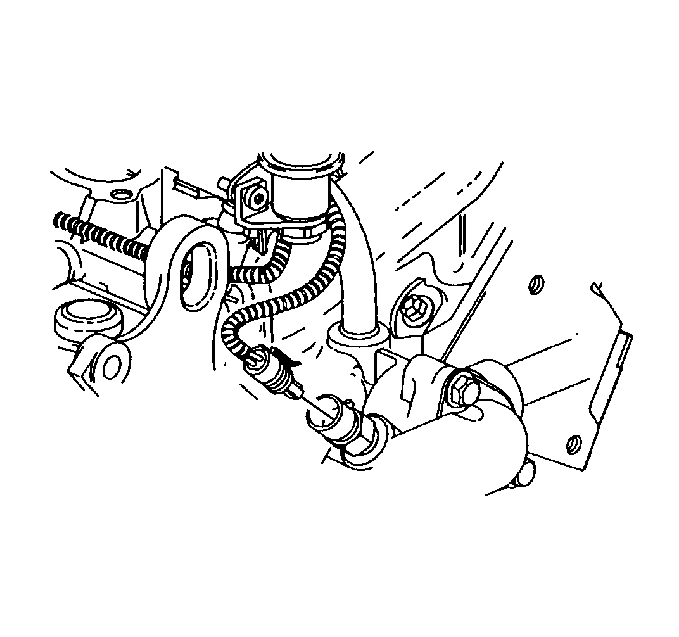
- Disconnect the engine
coolant temperature (ECT) wiring harness.
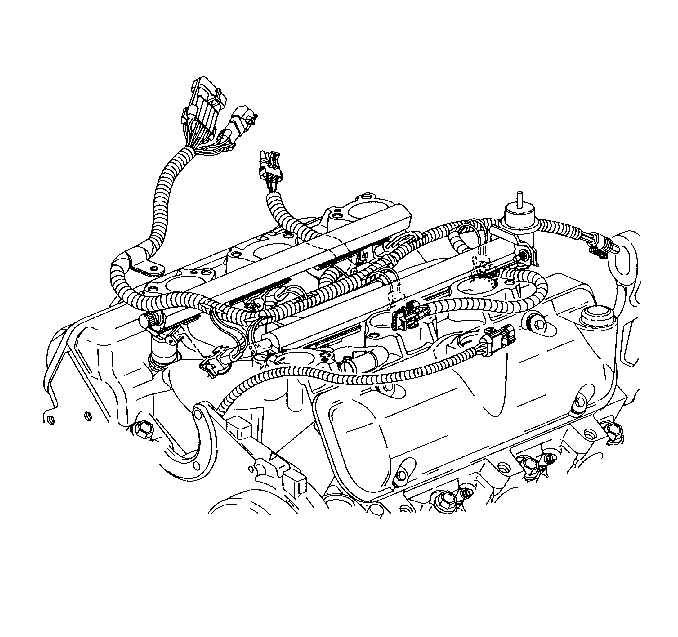
- Disconnect and remove
the fuel injector and manifold air pressure (MAP) wiring harness.
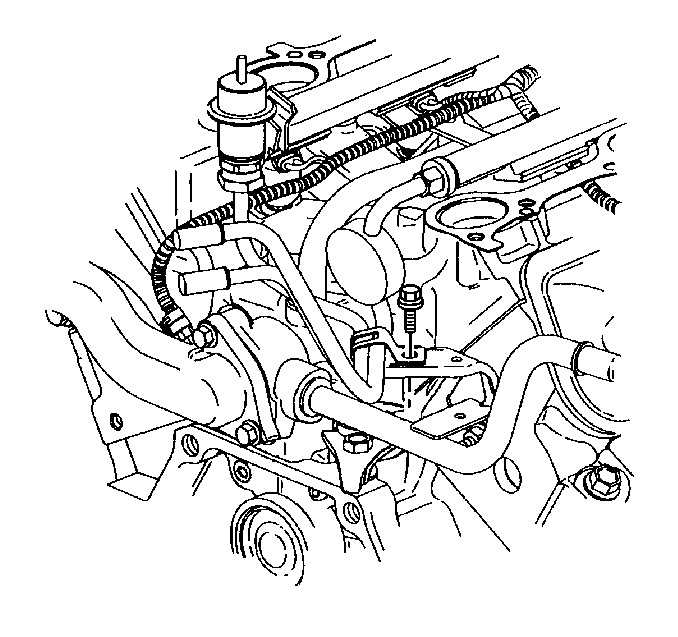
- Remove the fuel pipe clip
bolt.
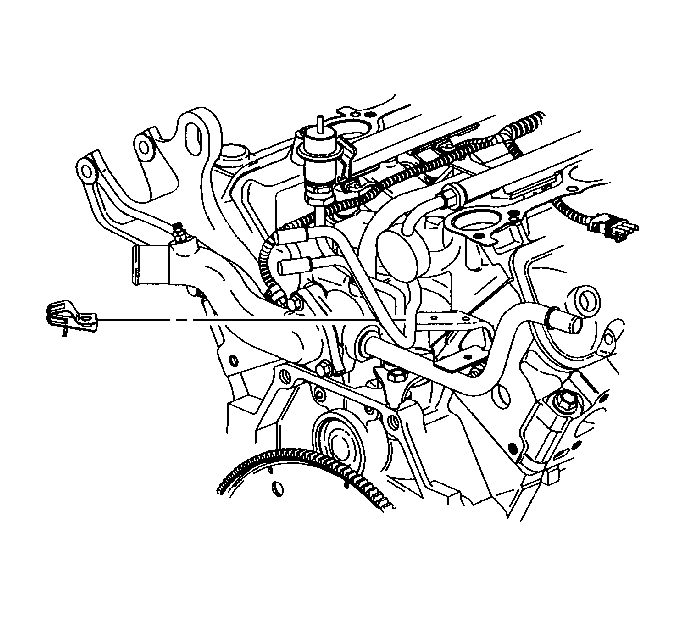
- Remove the fuel pipe clip.
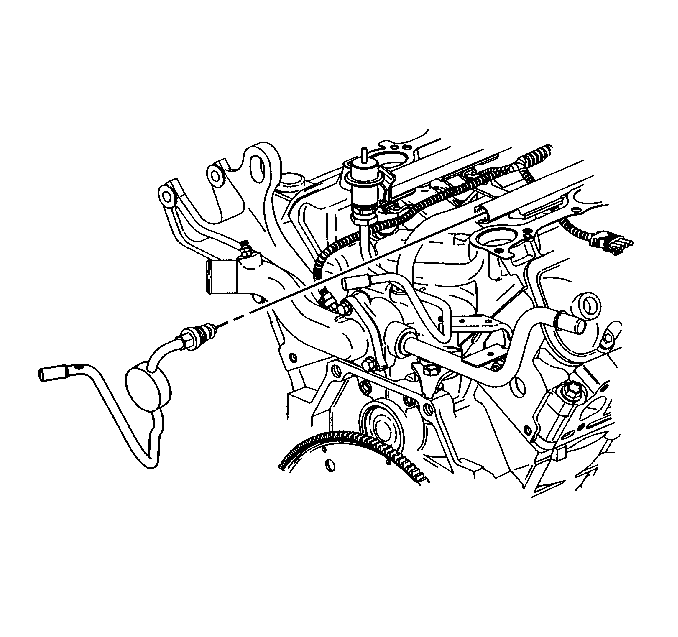
- Disconnect the fuel feed
pipe from the fuel injector rail. Refer to Fuel Hose/Pipes Replacement (Engine Compartment)
in Engine Controls -
3.1L.
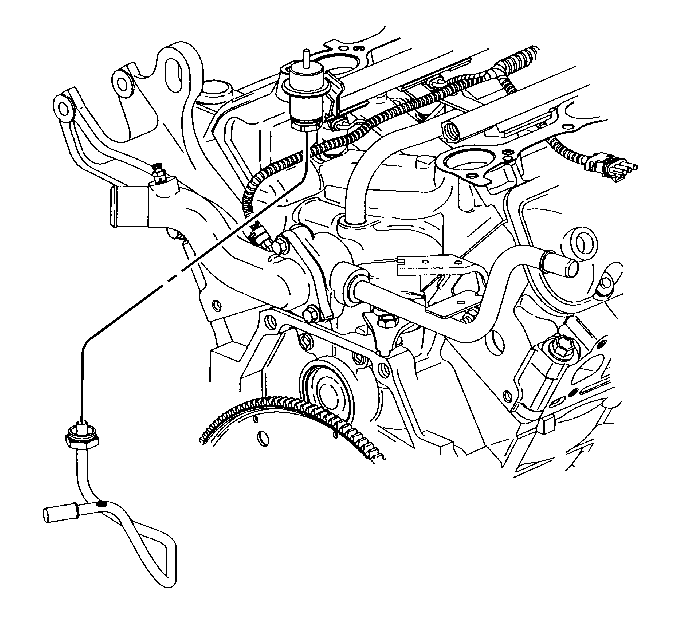
- Disconnect the fuel return
pipe from the fuel injector rail. Refer to Fuel Hose/Pipes Replacement (Engine Compartment)
in Engine Controls -
3.1L.
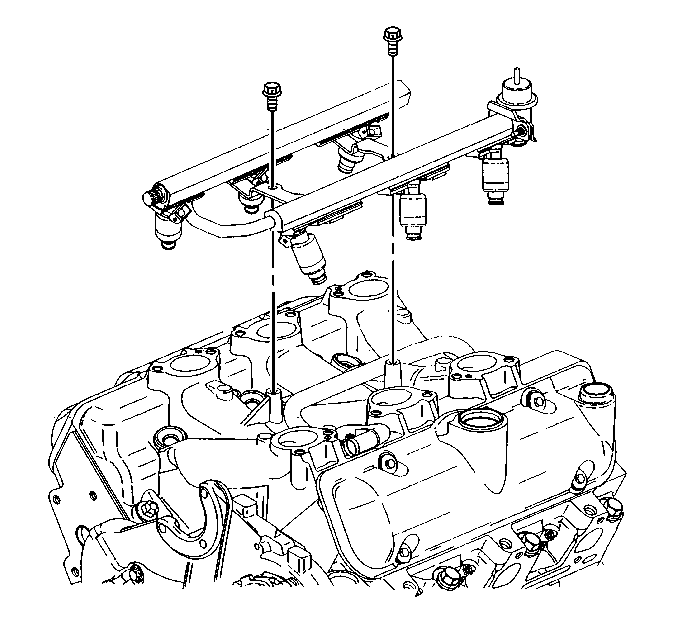
- Remove the fuel injector
rail. Refer to
Fuel Injection Fuel Rail Assembly Replacement
in Engine Controls - 3.1L.
- Remove the power steering pump from the front engine cover and
reposition. Refer to
Power Steering Pump Replacement
in Power Steering System.
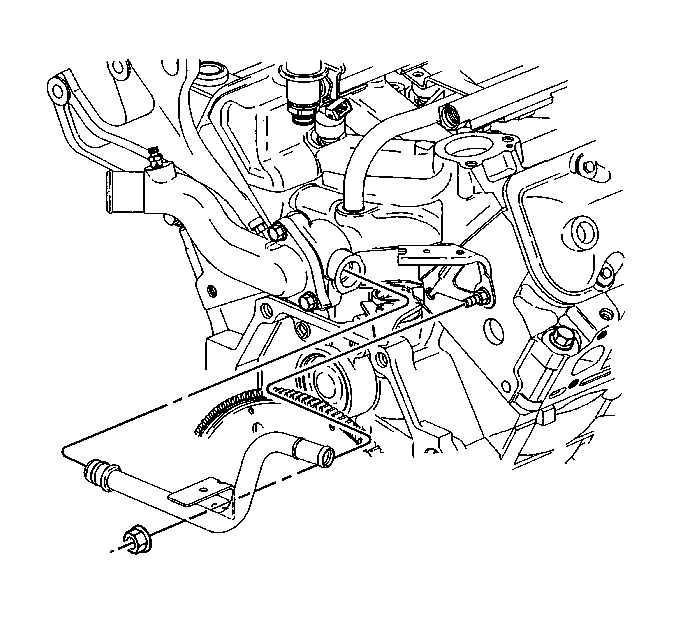
- Disconnect the heater
inlet pipe with heater hose from the lower intake manifold and reposition.
- Disconnect the radiator inlet hose from the engine. Refer to
Radiator Hose Replacement
in Engine Cooling.
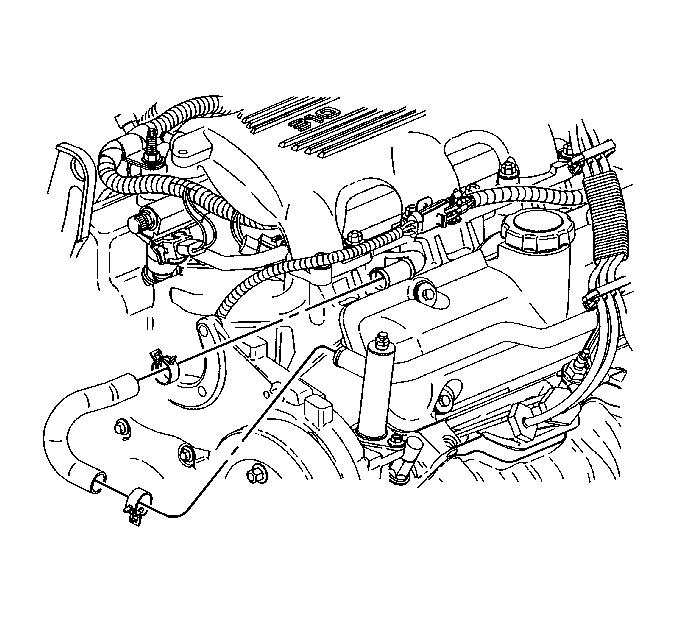
- Disconnect the thermostat
bypass hose from the thermostat bypass pipe and lower intake manifold pipe.
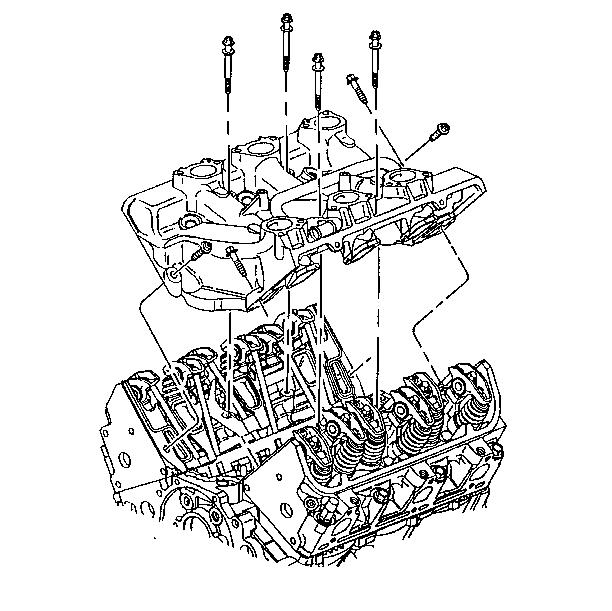
- Remove the lower intake
manifold bolts.
- Remove the lower intake manifold.
- Remove the valve rocker arms and pushrods. Refer to
Valve Rocker Arm and Push Rod Replacement
.
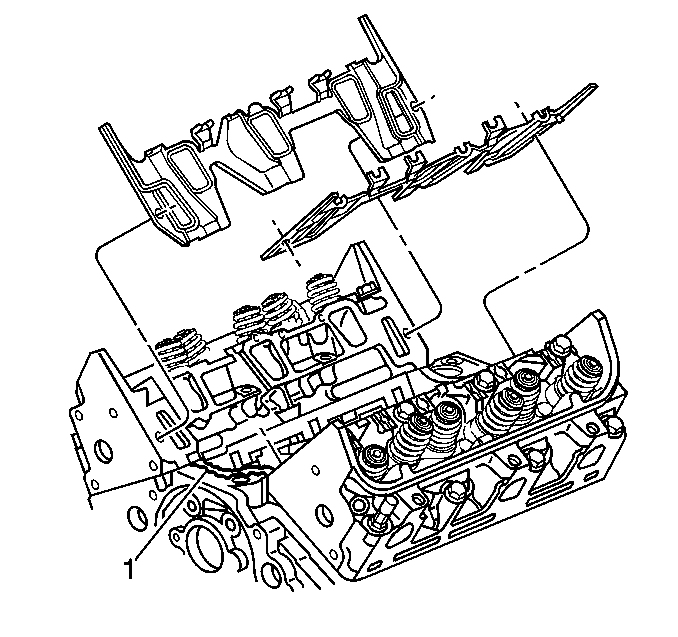
- Remove the lower intake
manifold gaskets and seals.
- Clean the lower intake manifold gasket and seal surfaces on the
cylinder heads and the engine block.
- Clean the gasket and seal surfaces on the lower intake manifold
with degreaser.
- Remove all the loose RTV sealer.
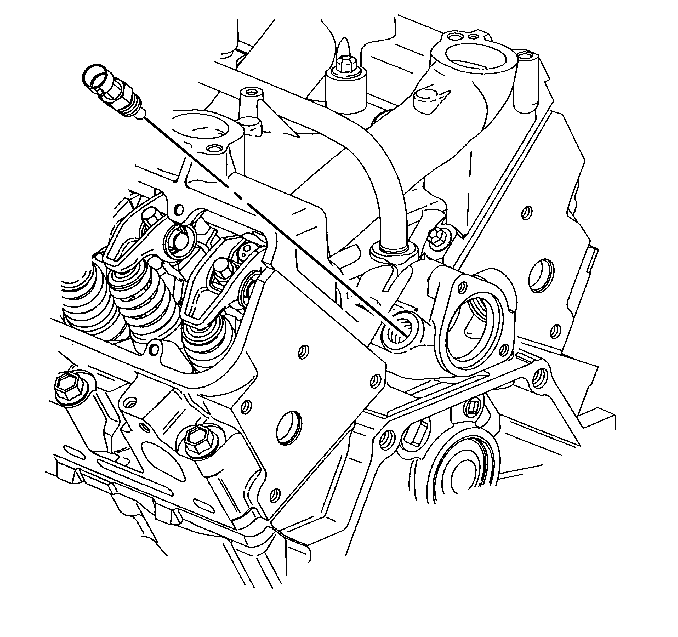
- If replacing the lower intake manifold remove the engine coolant temperature
(ECT) sensor.
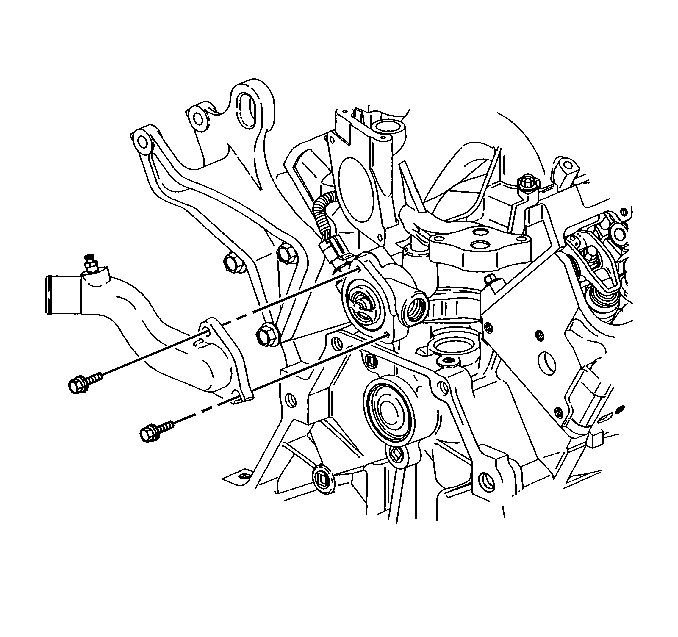
- If replacing the lower
intake manifold remove the water outlet bolts.
- Remove the water outlet.
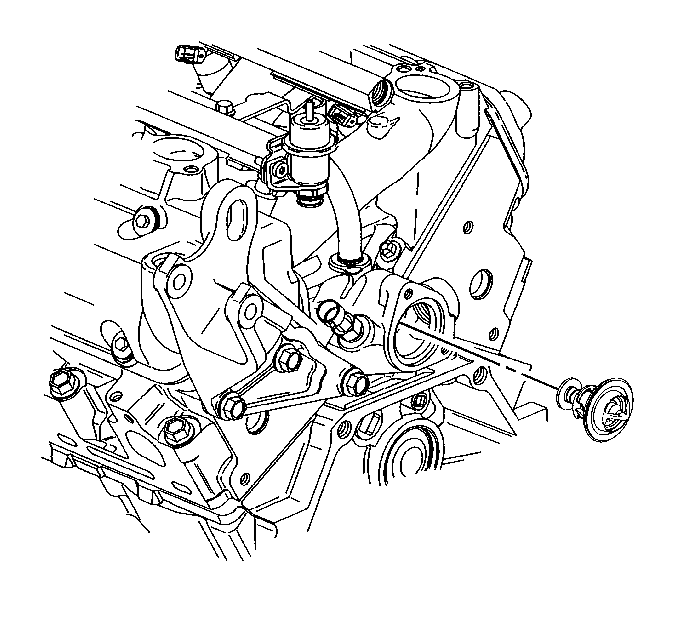
- If replacing the lower
intake manifold remove the thermostat. Refer to
Engine Coolant Thermostat Replacement
in Engine Cooling.
Installation Procedure

- If removed, install the
thermostat. Refer to
Engine Coolant Thermostat Replacement
in Engine Cooling.

- If removed, install the
water outlet. Refer to
Water Outlet Housing Replacement
.
Notice: Use the correct fastener in the correct location. Replacement fasteners
must be the correct part number for that application. Fasteners requiring
replacement or fasteners requiring the use of thread locking compound or sealant
are identified in the service procedure. Do not use paints, lubricants, or
corrosion inhibitors on fasteners or fastener joint surfaces unless specified.
These coatings affect fastener torque and joint clamping force and may damage
the fastener. Use the correct tightening sequence and specifications when
installing fasteners in order to avoid damage to parts and systems.
- Install the water
outlet bolts.
Tighten
Tighten the water outlet bolts to 25 N·m (18 lb ft).

- If removed, install the engine coolant temperature (ECT) sensor.
Tighten
Tighten the engine coolant temperature (ECT) sensor to 23 N·m
(17 lb ft).

- Apply 8-12 mm
(0.08-0.11 in) bead of RTV Sealer, GM P/N 12345739 or
equivalent, on each ridge where front and rear of the lower intake manifold
contact the engine block (1).
- Install the lower intake manifold gaskets.
- Install the valve rocker arms and pushrods. Refer to
Valve Rocker Arm and Push Rod Replacement
.

- Install the lower intake
manifold.
- Apply sealant, GM P/N 12345382 to the threads of the bolts.
Notice: An oil leak may result if the vertical bolts are not tightened before
the diagonal bolts.
- Hand tighten the vertical lower intake manifold bolts.
- Hand tighten the diagonal lower intake manifold bolts.
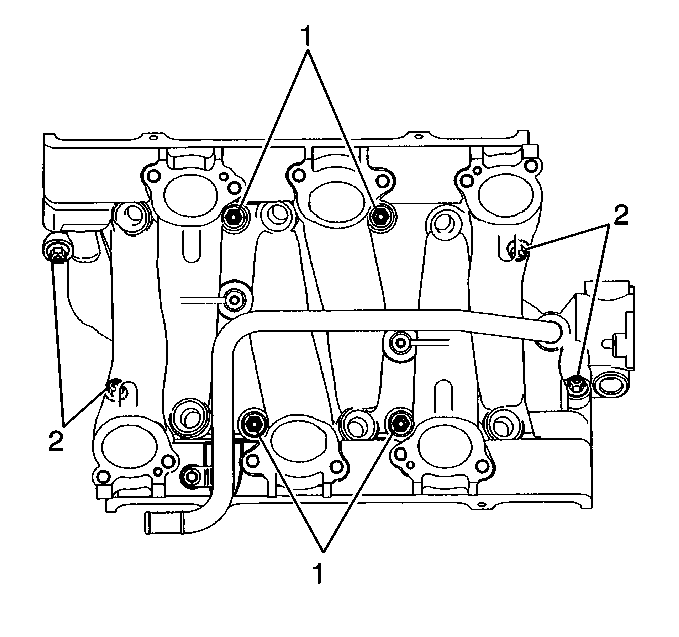
- Install the lower intake manifold bolts.
Tighten
- Tighten the vertical lower intake manifold bolts (1) to 13 N·m
(115 lb in).
- Tighten the diagonal lower intake manifold bolts (2) to 13 N·m
(115 lb in).

- Connect the thermostat
bypass hose to the thermostat bypass pipe and lower intake manifold pipe.
- Connect the radiator inlet hose to the engine. Refer to
Radiator Hose Replacement
in Engine Cooling.

- Connect the heater inlet
pipe and heater hose to the lower intake manifold.
- Install the power steering pump to the front engine cover. Refer
to
Power Steering Pump Replacement
in Power Steering System.

- Install the fuel injector
rail. Refer to
Fuel Injection Fuel Rail Assembly Replacement
in Engine Controls - 3.1L.

- Connect the fuel return
pipe to the fuel injector rail. Refer to Fuel Hose/Pipes Replacement (Engine Compartment)
in Engine Controls -
3.1L.

- Connect the fuel feed
pipe to the fuel injector rail. Refer to Fuel Hose/Pipes Replacement (Engine Compartment)
in Engine Controls -
3.1L.

- Install the fuel pipe
clip.

- Install the fuel pipe
clip bolt.
Tighten
Tighten the fuel pipe clip bolt to 8 N·m (71 lb in).

- Install and connect the
fuel injector and manifold air pressure (MAP) wiring harness.

- Connect the engine coolant
temperature (ECT) wiring harness.
- Install the right (rear) valve rocker arm cover. Refer to
Valve Rocker Arm Cover Replacement
.
- Install the left (front) valve rocker arm cover. Refer to
Valve Rocker Arm Cover Replacement
.
- Install the upper intake manifold. Refer to
Intake Manifold Replacement
.
- Connect the battery ground (negative) cable.



































